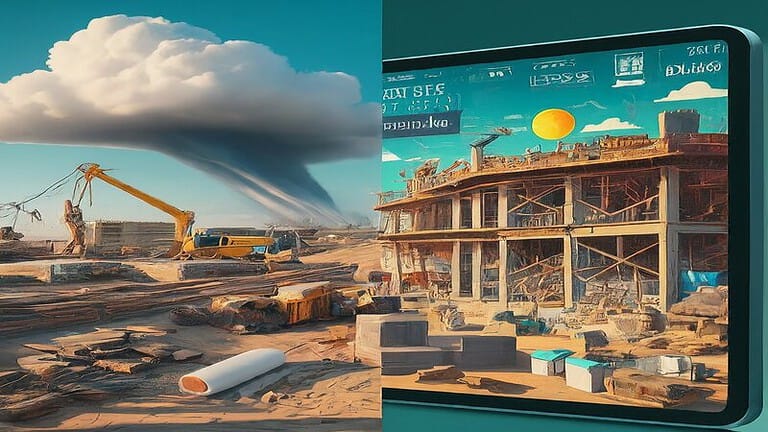In the fast-paced realm of construction, adapting to emerging trends is not just advantageous—it’s essential. As we delve into the trends shaping the construction industry in 2024, two keywords stand out prominently: innovation and efficiency. In this landscape, staying ahead requires embracing transformative technologies and strategies. Key to increasing efficiency in construction supply chain Management is the adoption of construction estimating software. In 2024, this software is not merely a tool; it’s a game-changer, revolutionizing the way construction projects are planned, executed, and managed. This trend underscores the growing importance of construction cost estimating software in optimizing project outcomes and maximizing efficiency.
Understanding the Construction Supply Chain
The construction supply chain is a multifaceted system encompassing various stages, including procurement, manufacturing, transportation, and delivery. Moreover, each stage involves coordination among multiple stakeholders, including suppliers, manufacturers, contractors, and subcontractors. In addition, challenges such as delays in material delivery, inventory shortages, and communication gaps can significantly impact project timelines and costs. Therefore, this underscores the need for efficient supply chain management.
Embracing Technology and Automation
Technology plays a pivotal role in enhancing efficiency throughout the construction supply chain. Firstly, construction management software streamlines processes, automates tasks, and provides real-time visibility into project status and inventory levels. Furthermore, the integration of IoT (Internet of Things) devices and RFID (Radio Frequency Identification) technology enables accurate tracking of materials, thereby reducing errors and minimizing stockouts. Additionally, AI (Artificial Intelligence) and machine learning algorithms can analyze historical data to predict demand patterns, optimize inventory levels, and improve resource allocation.
Streamlining Communication and Collaboration
Effective communication and collaboration are essential for smooth operations within the construction supply chain. Moreover, transparent communication among stakeholders fosters alignment, reduces misunderstandings, and facilitates timely decision-making. Additionally, cloud-based collaboration platforms enable real-time sharing of project documents, schedules, and updates, thereby promoting collaboration among distributed teams. Furthermore, by centralizing information and fostering collaboration, construction companies can mitigate delays and streamline workflows.
Optimizing Inventory and Logistics
Optimizing inventory and logistics is crucial for minimizing waste, reducing costs, and improving overall efficiency. Furthermore, adopting Just-In-Time (JIT) inventory management practices ensures that materials are delivered precisely when needed, thereby reducing inventory holding costs and eliminating excess inventory. Additionally, Lean principles help identify and eliminate waste throughout the supply chain, thus optimizing processes and maximizing value. Moreover, improving logistics efficiency through route optimization, vehicle tracking, and delivery scheduling minimizes transportation costs and enhances on-time deliveries.
Enhancing Supplier Relationships
Strong relationships with suppliers are fundamental to a well-functioning construction supply chain. Additionally, establishing long-term partnerships based on trust, reliability, and mutual benefit fosters collaboration and ensures priority access to materials. Moreover, negotiating favorable contracts and terms can lead to cost savings and improved supply chain flexibility. Furthermore, by working closely with suppliers, construction companies can proactively address potential challenges and explore opportunities for continuous improvement.
Risk Management and Contingency Planning
Risk management is essential for identifying, assessing, and mitigating potential disruptions within the construction supply chain. Moreover, developing contingency plans for scenarios such as material shortages, transportation delays, or supplier bankruptcies helps minimize the impact of unexpected events. Additionally, utilizing predictive analytics and risk assessment tools enables construction companies to anticipate and proactively address potential risks, thus ensuring resilience and continuity of operations.
Implementing Sustainable Practices
Sustainability is increasingly becoming a priority in construction supply chain management. Additionally, incorporating sustainable materials and practices not only reduces environmental impact but also enhances efficiency and resilience. Furthermore, promoting green logistics and transportation methods, such as using electric vehicles or optimizing delivery routes, reduces carbon emissions and transportation costs. Moreover, aligning with environmental regulations and corporate social responsibility (CSR) goals strengthens brand reputation and attracts environmentally conscious clients.
Investing in Employee Training and Development
Investing in employee training and development is essential for building a skilled and knowledgeable workforce capable of driving supply chain efficiency. Furthermore, providing training on supply chain management best practices equips employees with the tools and techniques needed to identify and implement efficiency improvements. Additionally, empowering employees to collaborate across functions and share knowledge fosters innovation and continuous improvement, thereby driving long-term competitiveness.
Continuous Improvement and Adaptation
Continuous improvement is an ongoing process that requires regular evaluation, iteration, and adaptation. Establishing key performance indicators (KPIs) allows construction companies to measure and track supply chain performance against established benchmarks. Conducting regular audits and evaluations helps identify areas for improvement and opportunities for optimization. Embracing a culture of continuous improvement and adaptation ensures that construction companies remain agile and responsive to changing market dynamics and customer needs.
Efficiency in construction supply chain management is essential for achieving project success in a competitive and dynamic industry landscape. By embracing technology, streamlining communication, optimizing inventory and logistics, enhancing supplier relationships, and implementing sustainable practices, construction companies can create a resilient and efficient supply chain. Investing in employee training and development and fostering a culture of continuous improvement ensures that companies remain agile and adaptive to evolving challenges and opportunities. By prioritizing supply chain efficiency, construction companies can drive innovation, reduce costs, and deliver projects on time and within budget, ultimately enhancing competitiveness and long-term success.
FAQs for “Creating Efficiency in Construction Supply Chain Management”
What is construction supply chain management, and why is it important?
- Construction supply chain management involves overseeing the flow of materials, information, and resources from suppliers to construction sites. It is crucial for ensuring timely delivery of materials, reducing costs, and optimizing project efficiency.
What are some common challenges faced in construction supply chain management?
- Common challenges include delays in material delivery, inventory shortages, communication gaps among stakeholders, transportation inefficiencies, and disruptions due to unforeseen events.
How does technology contribute to efficiency in construction supply chain management?
- Technology such as construction management software, IoT devices, RFID technology, AI, and machine learning helps streamline processes, automate tasks, provide real-time visibility into project status and inventory levels, and optimize resource allocation.
Why is communication and collaboration important in construction supply chain management?
- Transparent communication and collaboration among stakeholders facilitate alignment, reduce misunderstandings, and promote timely decision-making, leading to smoother operations and enhanced efficiency.
What are some strategies for optimizing inventory and logistics in construction supply chain management?
- Strategies include adopting Just-In-Time (JIT) inventory management, implementing Lean principles to eliminate waste, and improving logistics efficiency through route optimization, vehicle tracking, and delivery scheduling.















